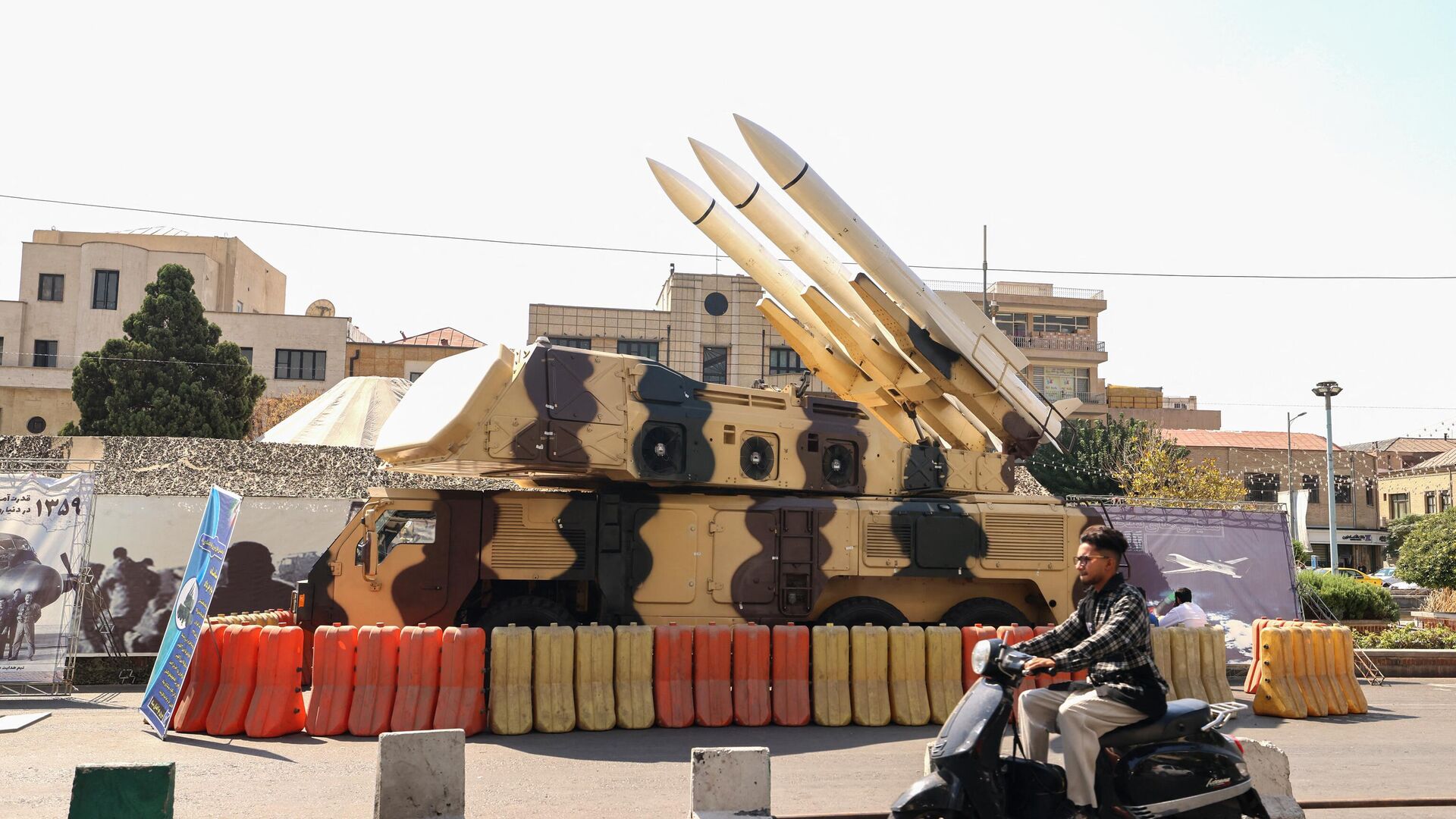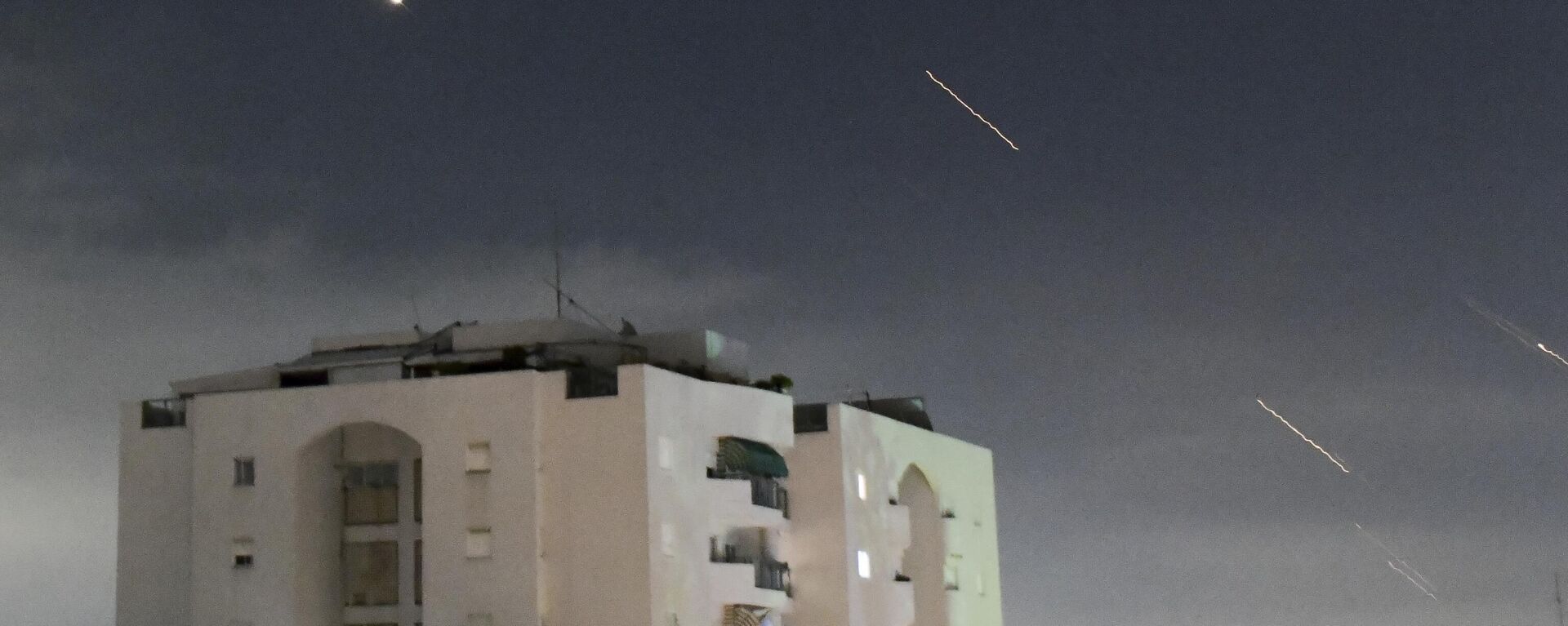https://sputniknews.in/20240414/iran-israel-conflict-india-should-step-in-to-defend-its-interests-in-middle-east-7130813.html
Iran-Israel Conflict: India Should Step In to Defend Its Interests in Middle East
Iran-Israel Conflict: India Should Step In to Defend Its Interests in Middle East
Sputnik India
India should become “more active role-player" in the Middle-East amid the Iran-Israel tensions which risk escalating into a wider conflict, a veteran Indian diplomat has told Sputnik India.
2024-04-14T16:01+0530
2024-04-14T16:01+0530
2024-04-14T16:18+0530
sputnik opinion
iran
israel
india
the united nations (un)
israel defense forces (idf)
indian navy
joe biden
benjamin netanyahu
antony blinken
https://cdn1.img.sputniknews.in/img/07e8/04/0e/7133525_0:0:3072:1728_1920x0_80_0_0_d46f4e2af90bce9cbf0fa62a841cacf3.jpg
India should become “more active role-player" in the Middle-East amid the Iran-Israel tensions which risk escalating into a wider conflict, a veteran Indian diplomat has told Sputnik India.Ambassador Talmiz Ahmad, who has served as India's envoy in Saudi Arabia, the United Arab Emirates (UAE) and Oman, told Sputnik India that New Delhi had widespread economic, energy and diaspora interests in the region.“India has every reason to be concerned with Iran-Israel tensions. The whole international community should agitate for a de-escalation in Tel Aviv,” he stressed.India, which has good ties with both Iran and Israel, called for an "immediate de-escalation" following the Iranian strikes inside Israel.Ambassador Anil Trigunayat, a former Indian envoy to Jordan, Libya and Malta, also highlighted that any escalation between Israel and Iran “directly impinged” upon Indian interests.New Delhi has already been grappling with the spillover from the Gaza conflict in the form of attacks on merchant vessels in the Arabian Sea. In recent months, the Indian Navy has launched operations in response to drone and missile attacks in the region, as well as counter-piracy actions.Significantly, two major connectivity initiatives—the International North South Transport Corridor (INSTC) and the India-Middle-East-Europe-Economic Corridor (IMEEC)—pass through Iran and Israel respectively.Israel Used Iran Embassy Attack as Distraction from Ceasefire with PalestineIsraeli Prime Minister Benjamin Netanyahu has deliberately escalated tensions with Iran to distract the global community from the more pressing questions of implementing a ceasefire in the Gaza Strip or discuss a post-conflict strategy to achieve a two-state solution of the Palestine cause, Ahmad said.Ahmad recalled that the US had refused to veto a ceasefire resolution in the Gaza Strip at the United Nations (UN) Security Council on 25 March, rather abstaining from the vote.At the time, US Secretary of State Antony Blinken spelled out Biden administration's priorities for Israel- a ceasefire, the release of hostages, a surge in humanitarian assistance and a clear pathway planned for the future.Ahmad said that the Israel Defence Forces (IDF) strike killing seven workers of World Central Kitchen in Gaza on 1 April further frayed relations between the two allies."I would say that Israel had anticipated an Iranian response to the 1 April attack, but Netanyahu had also calculated that Tehran's response would be calibrated and that it wasn't interested in a region-wide conflagration," he added.Ahmad cited official Iranian statements to emphasise that Tehran waited for 13 days before launching a "measured" retaliation."It was a symbolic retaliation meant to send a message to Israel and the US. Iran has demonstrated that it possesses the capabilities to target Israel," argued Ahmed, as he noted that the Iranian Permanent Mission (PR) at the United Nations (UN) had deemed the matter as "concluded" following strikes on Israel.Global Pressure on Netanyahu to Not Escalate Following Iranian StrikesThe pressure is on Netanyahu to not escalate tensions with Iran into a war following direct aerial strikes by Tehran and its regional allies, Ahmad said.While condemning the attacks and expressing commitment to Israel's "defence", US President Joe Biden reportedly told Netanyahu during a phone call on Sunday that it would not support an Israeli "counter attack".He ventured that Netanyahu's diversion seemed to have served its purpose.Dwelling on Iran's options, Ahmad said that Iran wouldn't want to engage in a "conventional conflict" in the wake of years of western sanctions.Ahmad said that Tehran was engaged militarily through its "proxies" in Lebanon, Yemen, Iraq and Syria.
https://sputniknews.in/20240414/india-urges-de-escalation-following-irans-drone--missile-attack-on-israel-7128352.html
iran
israel
india
imec
gulf countries
persian gulf (arabian gulf)
gaza strip
Sputnik India
feedback.hindi@sputniknews.com
+74956456601
MIA „Rossiya Segodnya“
2024
Dhairya Maheshwari
https://cdn1.img.sputniknews.in/img/07e6/0c/13/138962_0:0:641:640_100x100_80_0_0_2cb44360dbcdf6d84bf4b299cd045917.jpg
Dhairya Maheshwari
https://cdn1.img.sputniknews.in/img/07e6/0c/13/138962_0:0:641:640_100x100_80_0_0_2cb44360dbcdf6d84bf4b299cd045917.jpg
News
en_IN
Sputnik India
feedback.hindi@sputniknews.com
+74956456601
MIA „Rossiya Segodnya“
Sputnik India
feedback.hindi@sputniknews.com
+74956456601
MIA „Rossiya Segodnya“
Dhairya Maheshwari
https://cdn1.img.sputniknews.in/img/07e6/0c/13/138962_0:0:641:640_100x100_80_0_0_2cb44360dbcdf6d84bf4b299cd045917.jpg
iran vs israel, iran attacks israel, gaza death toll, gaza ceasefire, israel news, israel iran war, israel iran war news, iran attack, iran attack israel, gaza news, gaza war, gaza death toll, india news, imeec, instc
iran vs israel, iran attacks israel, gaza death toll, gaza ceasefire, israel news, israel iran war, israel iran war news, iran attack, iran attack israel, gaza news, gaza war, gaza death toll, india news, imeec, instc
Iran-Israel Conflict: India Should Step In to Defend Its Interests in Middle East
16:01 14.04.2024 (Updated: 16:18 14.04.2024) Following the strikes inside Israel on Sunday, Iran said that Operation 'True Promise' had been concluded and it did not plan further attacks. But Tehran warned Israel against launching a counter-attack.
India should become “more active role-player" in the Middle-East amid the Iran-Israel tensions which risk escalating into a wider conflict, a veteran Indian diplomat has told Sputnik India.
Ambassador Talmiz Ahmad, who has served as India's envoy in Saudi Arabia, the United Arab Emirates (UAE) and Oman, told Sputnik India that New Delhi had widespread economic, energy and diaspora interests in the region.
"India should be an active role-player in the region because of its relevance to our seaborne trade and energy security But the most important factor for India is the safety of our community in the region," Ahmad said. "Any wider conflagration has the potential to affect around 9.5 million-strong Indian diaspora in the Gulf countries."
“India has every reason to be concerned with Iran-Israel tensions. The whole international community should agitate for a de-escalation in Tel Aviv,” he stressed.
India, which has good ties with both Iran and Israel, called for an
"immediate de-escalation" following the Iranian strikes inside Israel.
Ambassador Anil Trigunayat, a former Indian envoy to Jordan, Libya and Malta, also highlighted that any escalation between Israel and Iran “directly impinged” upon Indian interests.
“West Asia is the most important part of India's extended neighbourhood," Trigunayat told Sputnik India. "Therefore, security and stability there is of utmost importance as any escalation directly impinges on our interests, be it the safety and security of 9.5 million Indians, energy supplies or maritime trading routes as well as the ongoing strategic projects."
New Delhi has already been grappling with the spillover from the Gaza conflict in the form of attacks on merchant vessels in the Arabian Sea. In recent months, the
Indian Navy has launched operations in response to drone and missile attacks in the region, as well as counter-piracy actions.
Significantly, two major connectivity initiatives—the International North South Transport Corridor (INSTC) and the India-Middle-East-Europe-Economic Corridor (IMEEC)—pass through Iran and Israel respectively.
Israel Used Iran Embassy Attack as Distraction from Ceasefire with Palestine
Israeli Prime Minister Benjamin Netanyahu has deliberately escalated tensions with Iran to distract the global community from the more pressing questions of implementing a ceasefire in the Gaza Strip or discuss a post-conflict strategy to achieve a two-state solution of the Palestine cause, Ahmad said.
The diplomat said Netanyahu had found himself under increasing pressure from the US and global community at large until last month.
Ahmad recalled that the US had refused to veto a
ceasefire resolution in the Gaza Strip at the United Nations (UN) Security Council on 25 March, rather abstaining from the vote.
At the time, US Secretary of State Antony Blinken spelled out Biden administration's priorities for Israel- a ceasefire, the release of hostages, a surge in humanitarian assistance and a clear pathway planned for the future.
Ahmad said that the Israel Defence Forces (IDF) strike killing seven workers of World Central Kitchen in Gaza on 1 April further frayed relations between the two allies.
"There was growing estrangement between Israel and its closest military backer the US over the Gaza operations. I believe that Israel's decision to hit the Iranian Embassy's consular section in Damascus was aimed at a distraction to shift the discourse from its growing criticism towards Iran. I suppose Israelis always knew that the discourse would change once Iran came into the picture in a bigger way," explained the veteran Indian diplomat.
"I would say that Israel had anticipated an Iranian response to the 1 April attack, but Netanyahu had also calculated that Tehran's response would be calibrated and that it wasn't interested in a region-wide conflagration," he added.
Ahmad cited official Iranian statements to emphasise that Tehran waited for 13 days before launching a "measured" retaliation.
"It was a
symbolic retaliation meant to send a message to Israel and the US. Iran has demonstrated that it possesses the capabilities to target Israel," argued Ahmed, as he noted that the Iranian Permanent Mission (PR) at the United Nations (UN) had deemed the matter as "concluded" following strikes on Israel.
"All in all, it was a very cynical, immoral and a mischievous strategy on part of Netanyahu. He has shown that he would be willing sleepwalk into a war, and bring destruction not only to the entire region, but also upon his own country," stated the veteran Indian Ambassador. "A protracted conflict in Gaza and the threat of a regional war is serving nobody' interest other than ensuring the political survival of Netanyahu."
Global Pressure on Netanyahu to Not Escalate Following Iranian Strikes
The pressure is on Netanyahu to not escalate tensions with Iran into a war following direct aerial strikes by Tehran and its regional allies, Ahmad said.
While condemning the attacks and expressing commitment to Israel's "defence", US President Joe Biden reportedly told Netanyahu during a phone call on Sunday that it would not support an Israeli "counter attack".
"As India and Israel's western allies call for de-escalation, the message is directed at Netanyahu to not escalate the situation any further," said Ahmad.
He ventured that Netanyahu's diversion seemed to have served its purpose.
"From an Israeli point of view, the only way to further escape from the question of ceasefire and eventual two-state solution would be to escalate matters further," said Ahmad.
Dwelling on Iran's options, Ahmad said that Iran wouldn't want to engage in a "conventional conflict" in the wake of years of western sanctions.
"As part of its geopolitical strategy, Iran has sought to move the frontiers of war as far away from its territorial borders as possible," he noted.
Ahmad said that Tehran was engaged militarily through its "proxies" in Lebanon, Yemen, Iraq and Syria.
"The future course of events depend on the Israeli reaction. I would contend that Netanyahu wouldn't be content with a quite de-escalation on the Iranian front," the ex-diplomat warned.



